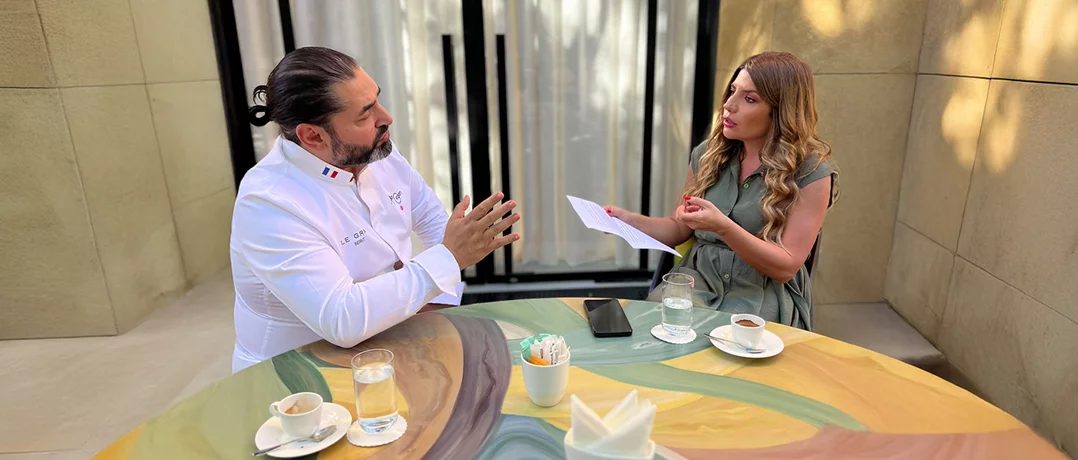From humble beginnings, Lebanese chef Alan Geaam became a Michelin-starred success by fusing Lebanese and French cuisine, now returning home to inspire others.
Grit, Flavor, and Fame: the Michelin-starred Lebanese hero Alan Geaam comes home
Grit, Flavor, and Fame: the Michelin-starred Lebanese hero Alan Geaam comes home


Nineteen
years after landing in Paris, with thirty dollars in his pocket and barely
speaking three words of French, painting buildings in the morning and washing
dishes at night, chef Alan Geaam had conquered his dream. “This sort of thing
only happens in movies, and this dream is now my life. I grew up in Tripoli, in
the old city, next to Souk El Attarin and Sahat El Nejmeh. The day you own your
own story, the day you believe in yourself, you can do anything. You can reach
the sky”, says the only Lebanese Michelin-starred chef at the moment.
Twenty
years ago, the trend was mixing Japanese flavors like yuzu and mizu with French
and Italian cuisine. Once he trusted himself enough, he blended Lebanese
flavors with French cuisine, which was the turning point in his life.
After
twenty-seven years abroad, it is with heightened emotions that Chef Alan
returns to his homeland Lebanon. He has learnt a wealth of information on
French gastronomy and is eager to share it with the Lebanese people.
In
Lebanon, a country famous for its hospitality, the level of the food is high
which poses a challenge. He will head a Lebanese restaurant, a French brasserie
bringing the French food culture to Beirut, both in Le Gray hotel, and that is
only the beginning.
The
Michelin star that propelled him
In May
2017, a man came in ordering the whole signature menu and paying for it. Before
taking his leave, he requested to speak with the chef showing him his id. The
man was a Michelin inspector. Chef Alan started trembling and asked if
everything was ok. The inspector answered that it was very interesting, it was
the first time in France that a chef combined French haute cuisine with subtle
Lebanese influences. The man left without a word for months till the third of
February 2018. Chef Alan gets a call at six pm. The director of Michelin
welcomed him to the family sharing the exalting news of him receiving his first
Michelin star.
Two other Lebanese chefs had received the honor before him. Australian/Lebanese
chef Greg Malouf has passed away in September 2024, and chef Clovis Khoury lost
the privilege due to lack in consistency, a key element in maintaining the
coveted status.
Every
year they pay surprise visits to check the food, the restaurant, and preserve
the star or take it away. Chef Alan has maintained a level of excellence in his
work and retained his star.
The
source of his inspiration and pride
“The
most important chef in all my life is my mom. It is with her that my love of
food began. I give her three Michelin stars. She cooks with a lot of emotion, sharing
a lot of love with her food. Everybody loved my mother, so one day I decided I
want to be like her”, chef Alan says to The Beiruter. His mom, sister and
brother live in Tripoli, one brother resides in the United States and another
in France. The always forgotten middle child cannot go unnoticed nowadays.
Poverty and a tough childhood during the civil war forged his resilience.
Married
with three kids, he is most proud to be a dad, and that his mom lacks for
nothing.
His
career began in 1999 when he went to Paris. He learnt how to cook and the
French technique from books. He had a target in mind, to become a
Michelin-starred chef. He opened his first restaurant in 2007 and learnt the
art and philosophy of French cuisine.
In 2017,
he opened the Alan Geaam restaurant mixing his Lebanese heritage and the French
flavor which he had perfected in eighteen years. It was the first time in Paris
the two cultures were blended in gastronomy and people felt the emotion behind
it as they savored the distinctive dishes.
As he
recounts, the moment he went into the theater to get his Michelin star is one
he will remember his whole life. “When I got my first restaurant Nicolas
Flamel, there was a lot of emotion around it. But when I went into the theater
with all the other chefs, after working hard for eighteen years to get it, oh
my God. You’re crying, a lot of emotions, you’re happy, you’re sad, you don’t
know how you feel. It was a fantastic moment”, affirmed chef Alan with ardor.
A
legacy written in stars and success
He was
shy about his story at the start of his career, when that changed and he became
proud of his identity, success followed. Currently, he has one hundred
employees in his company.
Chef
Alan Geaam is based in Paris, he has two Michelin-starred restaurants Alan
Geaam and Nicolas Flamel, Lebanese bistro Qasti, a restaurant in Lausanne
Switzerland and a consulting company with projects in Lebanon and Riyadh. Ovun
Bistro received the best Lebanese restaurant award in Riyadh from Time Out and
won a Michelin plate. He consults in Le K2 Palace in Courchevel as well. He’s
an accomplished author with three books under his belt.
Furthermore, he orchestrates dinners all over the world. A few days after this interview he flew to Melbourne for two VIP dinners.
My job is all about pleasure. Meeting the Lebanese diaspora everywhere and having them come up to meet me and take a picture with me, a source of pure delight. Leaving with nothing and coming back a hero, I thank God for that, I’m so blessed.
It is
the first time in history that the honorary president of the Bocus D’Or was
Lebanese. It is one of the world’s most prestigious chef competitions, often
dubbed the “Culinary Olympics” and it was held recently in Riyadh.
Armed
with grit and defying the odds
To this
day he wakes up early to be at work at 6:00 am. “Everything good that’s
happened to me I owe to my parents. My mother gave me generosity and her love
of cooking, my dad gave me discipline, waking up early and working hard all day
without keeping count nor expecting anything in return”, attests chef Alan with
affection. If nothing else, his story gives hope to the younger generations
that grit, never giving up, working hard, being passionate, and waiting for
your turn will lead to success. Nothing came easy for him; he worked hard for
everything. “Don’t be afraid of failures, in fact go after them, because after
every failure you come back stronger and learn valuable lessons.”
To keep his feet firmly planted on the ground and to work very hard, that’s his philosophy in life. He has yet to consider himself a success as he believes he is at the start of his career. He is thankful for the opportunity to get his message across to the Lebanese sunken in depression.
You are capable of more if you put your mind to it and are willing to work for it.
In a
country still reeling from economic collapse, his return is as symbolic as it
is personal. He hopes in the near future young chefs will follow in his
footsteps, embrace their story and heritage, then there will be hundreds of
Michelin-starred Lebanese chefs with the world at their feet.


